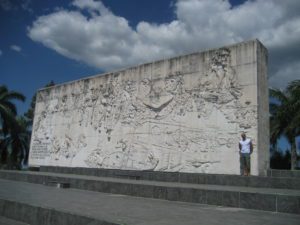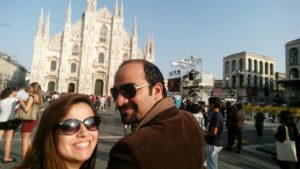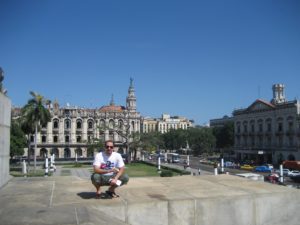The Minerva team partners with a network of global professionals to reach media and influencers in 30+ countries. This year we’ve worked with our partner Bashir Mraish based in Amman, Jordan who heads up his own communications consulting firm Bashir Mraish Consultancy.
Minerva wanted to find out what it’s like to operate communications in complex political environments and conflict zones in the Middle East and North Africa. We talked to Bashir to get his insights.
Communications can mean a lot of things. What does it mean to you?
Communications means we deliver a truthful message through channels like online, print, and broadcast outlets. In the Middle East and North Africa, rumors run rampant. There are now departments in many governments in the region to find and call out fake news. The public needs a trusted source and my work helps bring that to the region for my clients.
How did you get involved in communications consulting?
After I finished studying my master’s degree in Paris, I came back to Jordan and met with the CBS News Middle East manager. He was in charge of stories for 60 Minutes. He hired me from 2001-2007 and during that time I developed a lot of media connections in Jordan, Syria, Iraq, Lebanon, and Saudi Arabia. I thought, why not start my own agency so I can focus on work I find most important?
The work is intense and invigorating. I get to manage relationships between international companies and the media and bring truth to a region consumed by confusion.
What’s the most interesting type of work you do for your clients?
Crisis management. There is no manual for crises in places like Iraq and Syria. The only rule is to learn as you go and implement those lessons along the way.
You’ve worked with the United Nations, Microsoft, government officials, and a handful of nonprofits. How do you find your clients? Or how do your clients find you?
It took just a simple change. I optimized my website’s SEO and I started to bring in a lot of business. I also build personal connections with clients and have continued to nurture relationships with former colleagues.
What’s been the most interesting project you’ve worked on?
Advancing the eradication of violence against women in Iraq. The project brought together 11 UN agencies like UNICEF, UNESCO, and UNDP to teach Iraqis that women should have the right to vote, drive, and work; that they are equal to men.
It was a humbling project because I was the only man working with 25 females. The message was simple: Support women; support your mothers, sisters, and wives. We saw an 18% change in attitudes toward women based on a 50,000-person survey conducted before and after our work. Clearly, we have a lot of work to do for gender equality in both Iraq and the region, but I was happy to play a small part in the progress.
Tell us about your team.
My team is 15 people sprinkled throughout the Middle East – in Kurdistan, Baghdad, Basra (Iraq), Damascus (Syria), Amman (Jordan), and Dubai (UAE) – all navigating unique political landscapes.
You work with clients in conflict zones like Iraq and Syria. How do you manage to work in these tough areas?
I work there because no one else will. The big firms like Asdaa PR, H+K, Cicero & Barney, and Action Global Communications contract with me on a regular basis for client interviews, press briefings, and project management. It’s helpful that I speak Arabic in five different accents. When I’m in Iraq I speak with an Iraqi accent, ditto in Saudi Arabia.
Things can get dangerous. In Baghdad, I’ve seen terrorist attacks involving hijacking, kidnapping, and shootings. But the level of danger shifts all the time. ISIS is now pushed out of Baghdad and things seem safer. I was just in Syria a few weeks ago and in Damascus, things are safer and I’m able to conduct business.
Whenever I travel to these conflict zones, I keep it low profile. Lots of executives travel with a full security detail and a limo. That attracts attention. I take a taxi to my hotel and do my business. Also, my Jordanian passport helps me travel around the Middle East. American and British passports attract inquiring minds.
Overall, the violence affects how my clients operate but it never completely shuts things down. Sometimes the violence may postpone activities like outdoor media events, but the show goes on. People in these conflict zones want to feel like they’re back to a “normal” life again.
Do you think Western media coverage of the Middle East is fair?
I watch a lot of Western media and they don’t cover this region’s conflicts fairly. This is perpetuated by meeting many westerners and their ideas about the Middle East are horribly skewed.
Many think that people in the Middle East are barbaric, cities are chock full of terrorists, and everyone is uneducated. I would love for western media to give us the credit we deserve. Whenever I host a journalist from the States or Europe, I try to show them how great Jordan is.
If you have any friends who want to know what the real Middle East is like, tell them to come see me.
What is the media landscape like in the region?
Media in the Middle East are spoon fed, and that’s a big problem. We don’t have investigative journalists. Governments throw these types of journalists in jail when they propose or publish critical thought, unless they’re American or European. We need better journalism, I shouldn’t be able to influence truth by making a couple of phone calls.
On a lighter note, we heard you love to travel. What’s your favorite city in the world and why?
I have refrigerator magnets for all 196 cities I’ve been to. My favorite city is Havana. It doesn’t have a lot of tourists, the city is like a magical time capsule, and the food is spectacular.
I’ve also traversed Italy from north to south six times. The first time I went to Italy, I fell in love with the culture, language, and food. My wife shared the same love affair with the country and we started taking Italian language lessons in Amman. Now when we want to gossip about somebody at home, we speak Italian.


